Anne Wallace painting extract

An extract of Anne Wallace’s haunting painting ‘Passing the River at Woogaroo Reach’.
Commissioner's Update
New mental health commissioner
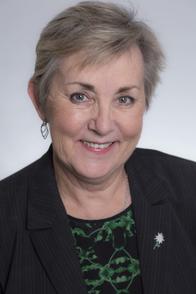
I would like to take this opportunity to thank all our readers for their support for the Commission in its first four years.
Most of you will be aware that Mr Ivan Frkovic will take up the role of Commissioner from 1 July 2017. Ivan will be known to many of you and I am sure that under his leadership the Commission will go from strength to strength.
We all have a role to play
The last four years have seen significant change in the conversation in Queensland. Better mental health and wellbeing, improving the lives of people living with mental illness and problematic alcohol and other drug use, and reducing the impact of suicide in our community—there is something each of us can contribute.
A stronger focus on the rights of people subject to involuntary treatment is evident in the Mental Health Act 2016 where many of the Commission’s recommendations were incorporated.
I am very proud that through my championing, the Queensland Government has finally agreed to negotiate redress for the survivors of horrific abuse when they were incarcerated as children in the Wolston Park Hospital for the ‘criminally insane’ from the 1960s up to the early 1980s. They did not have a mental illness. They had done no wrong. They were children in the care of the State and deserved to be treated better.
Many departments have taken leadership to improve the mental health and wellbeing of the community and their staff.
It is expected that people with lived experience will be at the table at all levels of policy and program design and implementation.
System transformation does not take place overnight. Mental Health Commissions in Australia are in their infancy and though different in their mandate and approach, they face high and often competing expectations. The 2016 review of the Queensland Mental Health Commission commended us on our achievement and acknowledged the importance of building a strong foundation, noting the challenging policy and service delivery environment. As change agents these Commissions must always challenge the status quo.
Thank you
A special thank you to the staff of the Commission and members of the Mental Health and Drug Advisory Council over the last four years.
Thank you also to the Hon Lawrence Springborg and the Hon Cameron Dick for their support.
My best wishes for a mentally healthy Queensland.
Dr Lesley van Schoubroeck
Acting Mental Health Commissioner
Grants closing soon
Stronger Community Mental Health and Wellbeing
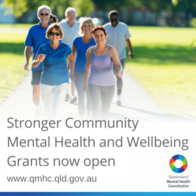
Funding of up to $50,000 is available under our Stronger Community Mental Health and Wellbeing Grants Program.
The grants support innovative, locally-led initiatives that promote social inclusion and reduce stigma and discrimination by encouraging community participation for people experiencing mental illness or problematic alcohol and other drug use, or those who have been affected by suicide.
Queensland local government, non-government and community organisations with evidence-based, collaborative initiatives are invited to apply.
Applications close 3.00pm Friday 30 June 2017.
Download the Grant Application Form and Application Guidelines
Waiting for justice
#WolstonWomen
This week we partnered with Access Arts and Open Minds to hold the artistic event Today I Am to honour the women survivors of Wolston Park.
The event featured the powerful art of Anne Wallace, whose painting Passing the River at Woogaroo Reach and portrait series pays tribute to the women’s strength and resolve.
The women survivors of Wolston Park were children in the care of the State wrongfully placed in adult mental health facilities, where they survived abuse that significantly impacted their lives. The women received an apology from the State in 2010.
While we cannot undo the past, we must do everything we can to improve their futures.
Read about the reconciliation process
Mental Health Week
Get involved

Get involved in 2017 Queensland Mental Health Week (8-14 October) and show you #ValueMentalHealth.
Our goal in 2017 is to encourage more Queenslanders to value their mental health, while working together to reduce stigma.
Get involved:
- Host your own event
- Attend one of the many free events on offer
- Post a message of support
- Share stories, videos and articles on social media.
For all the latest on Queensland Mental Health Week go to qldmentalhealthweek.org.au
Renewing Queensland’s Strategic Plan
Final consultation forums
Consultation on renewing the Queensland Mental Health, Drug and Alcohol Strategic Plan 2014-2019 is in its final month. Submissions on the two discussion papers have closed and our final consultation forums will be held in Logan on 29 and 30 June 2017.
Over 200 people have attended our community and lived experience consultation forums so far. Thank you to all who have shared their views and experiences with us by attending a forum or by making a submission to our two discussion papers.
We intend to publish a report in late July 2017 summarising the views we have heard.
Go to our website for more information about renewing the Strategic Plan.
Lived experience
Shaping the future
On 15 May, we hosted a lived experience roundtable in Brisbane focusing on increasing and improving engagement of people with a lived experience, their families, carers and support people in the mental health, alcohol and other drug and suicide prevention systems.
The roundtable brought together people with a lived experience, their family and carers, as well as representatives from peak mental health, alcohol and other drug and suicide prevention organisations and agencies. The roundtable’s focus was on renewing our collective commitment to improve and increase engagement and leadership priorities of people with a lived experience, their families, carers and support people in the health system across all levels of policy, legislation and service development, delivery and evaluation.
Outcomes from the day will help shape the renewed Strategic Plan.
Client experiences of service integration
The University of Queensland’s Institute for Social Science Research (ISSR) has commenced research into service user experiences of service integration and referrals in North West, Central West and South West Queensland on behalf of the Commission.
As well as a literature review and policy analysis, the ISSR will interview people with a lived experience of mental health difficulties, mental illness and problematic alcohol and other drug use who have accessed (or attempted to access) human services in the three regions. The research will identify:
- things that support service users to take up referrals between services
- barriers to service users taking up referrals
- what individuals want, with a focus on meeting their needs holistically
- what good integration and referral processes mean to service users.
A Project Advisory Group, with members from government and non-government agencies, has been established to provide oversight and guidance to the project.
The research will be completed by early 2018.
System reform
Protecting human rights
Although the new Mental Health Act 2016 seeks to strengthen human rights protections, there is a need to ensure these rights are made a reality and can be enforced.
The Minister for Health has committed to reviewing the new Act after two years.
To prepare for the review, we have commenced a project to examine human rights and oversight protections for people receiving involuntary treatment.
We have engaged The University of New South Wales in partnership with Griffith University and The University of Sydney to undertake this research. The research will include case studies examining the experiences of people who have received involuntary treatment in hospital and in the community under the new Act and will inform our input into the review.
Aboriginal and Torres Strait Islander wellbeing
A number of actions of the Queensland Aboriginal and Torres Strait Islander Social and Emotional Wellbeing Action Plan 2016–18 have been delivered with two recent announcements made by the Queensland Government:
Strategy and action plan for children and families
The Queensland Government in partnership with Family Matters and community organisations has released Our Way: A generational strategy for Aboriginal and Torres Strait Islander children and families and Changing Tracks: An action plan for Aboriginal and Torres Strait Islander children and families.
Key programs in the first action plan include:
- $150 million for Aboriginal and Torres Strait Islander Family Wellbeing Services
- $6 million for the Empowering Families Innovation Fund, which includes $1.5 million for the First 1000 Days Australia program
- establishing the Queensland First Children and Families Board to guide the Our Way strategy and its implementation
- maximising kinship placements for children in out-of-home care.
Get the strategy and action plan
Commonwealth Games Reconciliation Action Plan
The Gold Coast 2018 Commonwealth Games Reconciliation Action Plan has been developed by the Queensland Government through the Office of the Commonwealth Games to support tangible actions and initiatives for Aboriginal and Torres Strait Islander people.
Through three priority areas of respect, relationships and opportunities, the RAP includes programs which promote the celebration of Indigenous culture, art and histories as well as increasing the Government’s cultural capabilities.
The RAP will work to increase Indigenous participation in sport and recreational programs, education, upskilling, employment and procurement. It’s aim is to leave a legacy of physical, social, emotional and community wellbeing.
Read more about the RAP
Building young Queenslanders for a global future
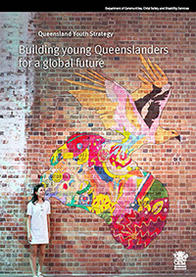
The Queensland Government has released the new Queensland youth strategy.
The strategy aims to create opportunities for young people to participate in decision-making that will affect their lives now and in the future, with the ultimate goal of helping young Queenslanders achieve their full potential.
The Commission has implemented Action 80 of the Strategy’s action schedule—to support the development of the Conversations for Life App for Young People. The app gives free, step-by-step support to young people to plan a conversation to help someone at risk of suicide or experiencing personal or social pressures. The app is expected to be launched soon.
Read more or get a copy of the Queensland youth strategy
Advisory Council
June meeting
The Council met again in June 2017. The meeting focused on the renewal of the Queensland Mental Health, Drug and Alcohol Strategic Plan 2014–2019, however Fetal Alcohol Spectrum Disorders (FASD) and emerging risks to reform were also discussed.
The meeting communique will be available on our website soon.
Profile: Dr Mark Wenitong
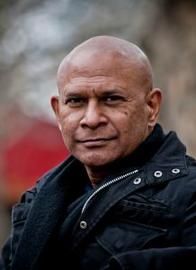
Dr Mark Wenitong is from the Kabi Kabi tribal group of South Queensland and is passionate about improving health outcomes for Aboriginal and Torres Strait Islander Australians.
To complement this passion and energy, Mark brings extensive expertise and experience to the Council. Involved in both clinical and policy work throughout his career, he is currently the Aboriginal Public Health Medical Officer at Apunipima Cape York Health Council, where he is working on health reform across the Cape York Aboriginal communities. Mark has also previously been a Senior Medical Officer at Wuchopperen Health Services in Cairns, a Medical Advisor for the Office for Aboriginal and Torres Strait Islander Health (OATSIH) in Canberra, the acting CEO of the National Aboriginal Community Controlled Health Organisation (NACCHO), and has worked in community development with World Vision in Papunya, Northern Territory.
Mark is a past president and founder of the Australian Indigenous Doctors Association and sits on numerous councils and committees. He is heavily involved in Aboriginal and Torres Strait Islander health workforce development and has helped develop several national workforce documents and sat on the COAG Australian Health Workforce Advisory Council. Mark is also involved in several research projects, and has worked in prison health, refugee health in East Timor, as well as studying and working in Indigenous health internationally.
Read more about Mark and other Council members on our website
Alcohol and other drugs
Impact of stigma and discrimination on Indigenous Queenslanders
We are seeking proposals to undertake research into the impact of stigma and discrimination related to problematic alcohol and other drug use on Aboriginal and Torres Strait Islander communities, families and individuals.
The project will consider the impact of stigma and discrimination on people experiencing problematic alcohol and other drug use. It will also examine the negative stereotypes that affect the social and emotional wellbeing of all Aboriginal and Torres Strait Islander people.
The research will be used to inform and develop activities to:
- reduce negative stereotypes experienced by Aboriginal peoples and Torres Strait Islanders
- improve access to support services and to support recovery for those who are experiencing problematic alcohol and other drug use
- improve social and emotional wellbeing of Aboriginal and Torres Strait Islander Queenslanders.
The research is a commitment under Action 6 of the Queensland Aboriginal and Torres Strait Islander Social and Emotional Wellbeing Action Plan 2016–18.
Expressions of interest close 4.30pm on 20 July 2017. More information on QTenders
Use and attitudes
Information on nearly 24,000 Australians' use of—and attitudes toward—alcohol, tobacco and other drugs has been released.
The Australian Institute of Health and Welfare’s report presents results from the 2016 National Drug Strategy Household Survey.
Key findings
- Young people (under 30) were smoking less, drinking less and using fewer illicit drugs in 2016 than in 2001
- More people in their 50s were consuming 11 or more standard drinks in one drinking occasion in 2016 than in 2013
- The proportion of Australians who smoke daily nearly halved from 24% in 1991 to 13% in 2013, but showed little change from 2013 to 2016 (12%)
- Overall, the most common recently used drugs were cannabis (10%), misuse of pharmaceuticals (5%), cocaine (3%) and ecstasy (2%)
- Declines in recent use of some illegal drugs in 2016 including meth/amphetamines (from 2.1% to 1.4%), hallucinogens (1.3% to 1.0%), and synthetic cannabinoids (1.2% to 0.3%).
Read more key findings
Results have also been released from the 2017 Global Drug Survey and 2017 FARE Annual Alcohol Poll
Suicide prevention
Strengthening suicide prevention in Queensland
On 16 May, we held targeted consultations with key stakeholders and agencies in the suicide prevention sector through two roundtables as part of the update to the Queensland Suicide Prevention Action Plan 2015-17.
The update will consider new opportunities and actions to achieve our shared goal of reducing suicide and its impact in Queensland.
An energetic group of people with a lived experience of suicide and representatives of community networks and services from across Queensland participated in the first roundtable, providing a broad range of issues and ideas to consider for the Suicide Prevention Plan update.
The second roundtable involved members of the Queensland Suicide Prevention Reference Group, Queensland Advisory Group on Suicide Information and Data, and the Co-chairs of the Suicide Prevention Health Taskforce who worked together to identify opportunities to strengthen the plan into the future.
The updated Suicide Prevention Plan is due to be publicly released in 2017-18.
Relationships, resilience, respect
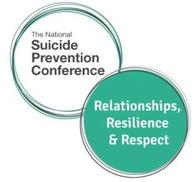
The National Suicide Prevention Conference is coming to Brisbane in July (26-29). The 2017 conference theme Relationships, resilience and respect: Responding to vulnerability in life will focus on suicide prevention across the whole life span.
The Commission has sponsored Suicide Prevention Australia $10,000 for bursaries to support eight Queenslanders to attend the conference. Bursary sponsorship was open to individuals with a lived experience of suicide, who demonstrated active involvement in organisations, networks or consumer advocacy within the suicide prevention or mental health sectors. The successful bursary recipients come from across Queensland and represent a broad range of perspectives.
Community
Sleeping out for homelessness
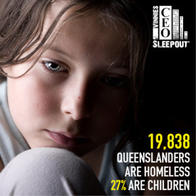
A place to call home is fundamental to the wellbeing of all of us. Safe, stable, secure housing is vital to good mental health and wellbeing. Sadly more than 105,000 Australians are homeless and almost 20,000 are Queenslanders.
Later this month the Commission’s Executive Director, Carmel Ybarlucea, will experience firsthand what too many men, women and children experience every night, by participating in the Vinnies CEO Sleepout.
If you would like to help Carmel make a difference, you can support her here
DIY Happiness
Parents, community members and community centre staff have learnt how to be happier and improve their health and wellbeing in simple, everyday ways over seven weeks at Kingston State School.
Using the Wheel of Wellbeing (WOW) framework, participants explored the six key areas of Body, Mind, Spirit, People, Place and Planet to support happiness and wellbeing for themselves and their families. Here’s what one of them said:
“Basically, you don’t know what you don’t know. It takes knowledge and experience to get a different perspective. I thought I was happy before [I did this training] but now I know there is another whole dimension to happiness.”
The WOW training was provided through a partnership of the school, Kingston East Neighbourhood Group, the Benevolent Society and the Logan and Southern Moreton Bay Islands Mental Health and Wellbeing Hub. More WOW initiatives are being planned in partnership with community across the State.
The Logan and Southern Moreton Bay Islands Mental Health and Wellbeing Hub, managed by Relationships Australia (Queensland), contributes to the Queensland Government’s priority to improve the mental health and wellbeing of all Queenslanders and is funded by the Commission.
Read more about the Hubs Initiative or contact Jan Elston, Relationships Australia, for more information about the Logan Hub at JElston@raq.org.au
Celebrate, participate, discover
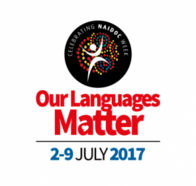
Celebrate the history, culture and achievements of Aboriginal and Torres Strait Islander peoples during NAIDOC Week this July.
The week is a great opportunity to participate in a range of activities and to support your local Aboriginal and Torres Strait Islander community.
The importance, resilience and richness of Aboriginal and Torres Strait Islander languages is this year’s focus with the theme ‘Our languages matter’.
Some ideas on how to celebrate:
- display the national NAIDOC poster in your workplace or classroom
- research the traditional Indigenous owners of your area
- visit local Indigenous sites of significance or interest
- learn the meanings of local or national Aboriginal and Torres Strait Islander place names and words
- start a hall of fame featuring Indigenous role models
- listen to Indigenous musicians or watch a movie about Aboriginal and Torres Strait Islander history
- host a community BBQ or luncheon.
More information, resources and ideas on how to get involved at naidoc.org.au
Sector News
Connecting the alcohol and other drugs sector
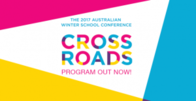
Hear from leading local and international alcohol and other drug experts, professionals and specialists, update your skills and knowledge, and network with colleagues and peers at the 2017 Australian Winter School Conference.
Over two days attendees will examine prevention, treatment and harm reduction, discuss research and emerging trends and identify ways to ensure the ongoing sustainability of the sector.
The Commission is a proud sponsor of this event.
When: 27-28 July 2017
Where: Mercure Brisbane, Queensland
More information or register at winterschool.org.au
Grants
- Local Drug Action Teams – Become a Local Drug Alcohol Team and help prevent alcohol and other drug harms in your community. Read more
- Empowering Families Innovation Grants – Funding is available for bold, new ideas that will make a difference to the lives of Aboriginal and Torres Strait Islander children and their families. Apply by 14 July. Read more
- ANZ Staff Foundation – The Foundation aims to support projects run by charitable organisations which offer a direct and tangible benefit to local communities. Apply by 15 July. Find out more
- Bennelong Foundation – To help guide the distribution of grants, the Foundation has identified seven key areas of focus. Out of these seven key areas, the current priority focus areas for the Foundation are: education, training and employment; community health; and migrant and Indigenous community welfare. More information
- HESTA Community Sector Awards 2017 – The HESTA Community Sector Awards recognise outstanding service provision, advocacy and leadership in improving the lives of people who rely on access to the services of this sector. Overall winners will share in a $30,000 prize pool. Read more
- June Canavan Foundation – Grants available to organisations to support driving sustainable change through programs in sport, education, health and conservation. Find out more
- The Honda Foundation – Financial assistance for charities and organisations doing amazing work across a range of social and environmental issues. Read more
- Moreton Bay Regional Council Community Grants Program – Through the Grants Program the Council recognises leadership and individual achievement, and develops and actively supports community organisations and individuals to positively contribute to community wellbeing and the cultural life of the region. More information
Resources
- Aboriginal and Torres Strait Islander Health Performance Framework Report 2017 – Launched by the Minister for Indigenous Health, Ken Wyatt, this is the latest report in a series which measures progress on health outcomes, health system performance and determinants of health (such as employment, education and safety). Download the report
- Keeping It Real: Reimagining mental health care for all young men – A new report released by Orygen, The National Centre of Excellence in Youth Mental Health finds that although young males are almost three times as likely to die by suicide as young Australian females, only a small proportion of young men are accessing services, or receiving appropriate treatment for their mental health difficulties. Get the report
- Mental health in remote and rural communities – A new research report released by the Royal Flying Doctor Service provides a snapshot of 2,567 country Australians flown by air from different parts of country Australia for emergency mental health care by the RFDS from July 2013 to June 2016. Download the report
- Practice guide: Communication between medical and mental health professionals – The General Practice Mental Health Standards Collaboration has released a new guide to help improve communication among medical and mental health professionals. Download the guide
- Queensland Needle and Syringe Program Directory App – This free app allows people to find their nearest needle and syringe program. It also contains useful information about safe injecting practices, blood borne viruses and overdose. Get the app
- Seeing a psychiatrist online – A Royal Australian and New Zealand College of Psychiatrists factsheet about seeing a psychiatrist over the internet, using video conference software. Download the factsheet
Events
- 26 June 2017 Suicide in the very old: The extremes of the gender paradox – A seminar by Emeritus Professor Diego de Leo. Read more
- 27 June 2017 Working with people of culturally and linguistically diverse backgrounds – Interactive workshops for clinicians and administration staff working in primary health care. Register
- 30 June – 1 July 2017 Inaugural Australasian Mental Health and Higher Education Conference — An international conference open to researchers, practitioners, educators and students working in the higher education mental health space. Go to the conference website
- 26-29 July 2017 National Suicide Prevention Conference – Brisbane. The theme Relationships, resilience and respect: Responding to vulnerability in life will bring to the fore these thematic issues in suicide prevention and how they may help or hinder implementation of initiatives at the community level. Register on the conference website
- 27 July 2017 Gold Coast Hospital and Health Service FASD Seminar Child Development Service – Attendance is $85 for professionals or $40 for parents. For more information contact Sue or Naomi at FASDGCH@health.qld.gov.au
- 27-28 July 2017 Australian Winter School Conference — Explore the complex intersection alcohol and other drugs have with other sectors with the themes of Collaborate, Coordinate and Integrate at the 2017 AWS Conference. More information at winterschool.org.au
- 29 July 2017 Hepatitis C in Drug and Alcohol Settings Education Program – A free course designed to strengthen the capacity of clinical staff working in drug and alcohol settings, or working with people who inject drugs, to effectively test for, treat and manage hepatitis C. Register
- 8-9 September PTS2017 Conference – An international forum to explore and share knowledge and advancements in treatment for Post Traumatic Stress. Read more
- 4-6 October 2017 Global Alcohol Policy Conference 2017 – Melbourne. Join the world’s alcohol policy makers and researchers at this 3-day conference. This conference’s theme is Mobilising for Change – Alcohol policy and the evidence for action. Early bird registrations close 30 June 2017. Go to the conference website
- 16 November 2017 National NDIS Mental Health Conference – Organised with support from the National Disability Insurance Agency (NDIA), the conference will bring Australia's mental health sector together to discuss the impact of the NDIS, learn about case studies where the NDIS has already been rolled out and plan for the future. Go to the conference website
Other
- Resilient Australia Awards – The awards recognise and promote initiatives that strengthen community disaster resilience across Australia. Nominations close 30 June 2017. Read more
- Survey: Consumer guide design and development – Health Consumers Queensland is seeking input from consumers who have had experience in representative roles. Feedback will feed into the development of a guide for consumers. Take the survey
